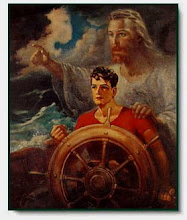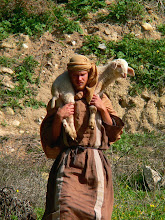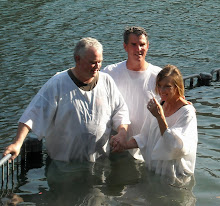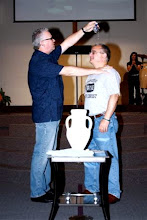When we hear John 3:16-17, we should know undeniably that God gave His Son to forgive us, not to forget us! God sent His Son to be the World's Savior from Heaven, not Heaven's Bully to Earth!
Hear these Christmas words of Jesus written in John's Good News Report, verses 16 & 17 (NLT): (16) For God so loved the world that He gave His only Son, so that everyone who believes in Him will not perish but have eternal life. (17) God did not send His Son into the world to condemn it, but to save it.
Because God didn't forget us, there is a Christmas. Let us remember Him during these Holy Days of Advent and beyond. In the words of that moving contemporary love song, it seems I can hear the Lord saying: I will remember you. Will you remember Me?"
ALL... JOY TO YOUR WORLD!
Grateful
Monday, November 30, 2009
Sunday, November 29, 2009
Christmas is Synonymous With Forgiveness
Father God sent His Son as a meal invitation, yes to offer us His love, friendship, and forgiveness. That's the meaning of sharing a meal in our Lord's Middle Eastern background. That's why Jesus got in trouble with the religious folk. He offered His love, friendship, and forgiveness to the sinners, evidenced by these words, "Jesus ate with sinners."It was the way He disarmed them and invited them to Eternal Life. (*See Bible reference below)
So, Father God sent His Son to be born in Bethlehem, a town known as "the House of Bread". Yes, the Baby Jesus was sent to be "the Bread of Life", and his cradle was a manger, "a feeding box". It's all about the most basic and blessed definition of Christmas -- forgiveness. So whatever Christmas is, it is an invitation to share a meal of love, friendship, and forgiveness with God. There are many wonderful words to explain Christmas, but to me Christmas is synonymous, yes, one-in-the-same, with forgiveness.
Christmas is undeniable evidence that God totally gives and God totally forgives. Will we share God's love, friendship, and forgiveness meal with others? Will we share the Baby Jesus, the Crucified Christ with those who are the seemingly hopeless among us and beyond us? Will we totally give our lives to God and totally forgive others? Will we celebrate Christmas for what it really is -- a meal invitation from God for our Eternal Life and meant to be shared with others?!
* Matthew 9:9-13 (NLT) -- (9) As Jesus was going down the road, He saw Matthew sitting at His tax-collection booth. "Come, be My disciple," Jesus said to Him. So Matthew got up and followed Him. (10) That night Matthew invited Jesus and His disciples to be His dinner guests, along with His fellow tax collectors and many other notorious sinners. (11) The Pharisees were indignant. "Why does your Teacher eat with such scum?" they asked His disciples. (12) When He heard this, Jesus replied, "Healthy people don’t need a doctor—sick people do." (13) Then He added, "Now go and learn the meaning of this Scripture: ‘I want you to be merciful; I don’t want your sacrifices.’ For I have come to call sinners, not those who think they are already good enough."
ALL... JOY TO YOUR WORLD!
Grateful
So, Father God sent His Son to be born in Bethlehem, a town known as "the House of Bread". Yes, the Baby Jesus was sent to be "the Bread of Life", and his cradle was a manger, "a feeding box". It's all about the most basic and blessed definition of Christmas -- forgiveness. So whatever Christmas is, it is an invitation to share a meal of love, friendship, and forgiveness with God. There are many wonderful words to explain Christmas, but to me Christmas is synonymous, yes, one-in-the-same, with forgiveness.
Christmas is undeniable evidence that God totally gives and God totally forgives. Will we share God's love, friendship, and forgiveness meal with others? Will we share the Baby Jesus, the Crucified Christ with those who are the seemingly hopeless among us and beyond us? Will we totally give our lives to God and totally forgive others? Will we celebrate Christmas for what it really is -- a meal invitation from God for our Eternal Life and meant to be shared with others?!
* Matthew 9:9-13 (NLT) -- (9) As Jesus was going down the road, He saw Matthew sitting at His tax-collection booth. "Come, be My disciple," Jesus said to Him. So Matthew got up and followed Him. (10) That night Matthew invited Jesus and His disciples to be His dinner guests, along with His fellow tax collectors and many other notorious sinners. (11) The Pharisees were indignant. "Why does your Teacher eat with such scum?" they asked His disciples. (12) When He heard this, Jesus replied, "Healthy people don’t need a doctor—sick people do." (13) Then He added, "Now go and learn the meaning of this Scripture: ‘I want you to be merciful; I don’t want your sacrifices.’ For I have come to call sinners, not those who think they are already good enough."
ALL... JOY TO YOUR WORLD!
Grateful
Labels:
Bethlehem,
bread,
celebrate,
Christ Jesus,
Christmas,
crucified,
eternal life,
forgive,
forgiveness,
friendship,
give,
invitation,
love,
manger,
meal,
Middle East,
share,
sinners
Saturday, November 28, 2009
The Words of The Wise Men
By embracing The Words of the Wise Men spoken when they arrived in Jerusalem and recorded in Matthew 2:1, let's move into this Glorious Christmas Advent Season proclaiming: We are on pilgrimage to worship Him! (The Message Paraphrase)
ALL... JOY TO YOUR WORLD!
Grateful
ALL... JOY TO YOUR WORLD!
Grateful
Friday, November 27, 2009
In the Afterglow Let's Not Miss The Advent
Cold turkey and a few slices of pumpkin roll await my attention in the fridge. Yesterday, my whole, immediate family gathered at our place to celebrate Thanksgiving. Counting the Oreo Pup, we had sixteen in our home for about seven hours or so. Wow!
Some people may say, "Wow? What's the big deal?" Well, it's very rare for the Willis family to all be together for Thanksgiving Day or any day for that matter. With three pastor sons and a fisherman dad, the holidays often require us to go in different directions. However, this year we were all blessed to meet at one place. So, in the deep places of my heart I am experiencing a Thanksgiving Afterglow; and it's only going to get better, because my hope is now shifting into overdrive. Why? Because I know the most wonderful time of the year is here --- the "Christmas is A'Coming" Advent Season.
Yes, I know it's Black Friday and perhaps I should be out scrambling for under-priced electronics and hooded-sweatshirts I don't really need, but honestly my desire is on an altogether more reflective level than a retail one. You see, after diving into that cold turkey one more time and savoring the last slice of Kim's delicious pumpkin roll, I plan on releasing my outdoor, Nativity characters from the garage for another fast-approaching December. Then, as this evening after Thanksgiving surrenders to the darkness and the days of November begin to dim, I'll have The Bethlehem Boy Who Brings Beautiful Joy perfectly spotlighted in our front yard for all our neighbors to see. (Or at least by Saturday evening. I'm resting. :-)
The point is, let the Holiday Celebration intensify! And In the Thanksgiving Afterglow Let's Not Miss the Christmas Advent.
ALL... JOY TO YOUR WORLD!
Grateful
Some people may say, "Wow? What's the big deal?" Well, it's very rare for the Willis family to all be together for Thanksgiving Day or any day for that matter. With three pastor sons and a fisherman dad, the holidays often require us to go in different directions. However, this year we were all blessed to meet at one place. So, in the deep places of my heart I am experiencing a Thanksgiving Afterglow; and it's only going to get better, because my hope is now shifting into overdrive. Why? Because I know the most wonderful time of the year is here --- the "Christmas is A'Coming" Advent Season.
Yes, I know it's Black Friday and perhaps I should be out scrambling for under-priced electronics and hooded-sweatshirts I don't really need, but honestly my desire is on an altogether more reflective level than a retail one. You see, after diving into that cold turkey one more time and savoring the last slice of Kim's delicious pumpkin roll, I plan on releasing my outdoor, Nativity characters from the garage for another fast-approaching December. Then, as this evening after Thanksgiving surrenders to the darkness and the days of November begin to dim, I'll have The Bethlehem Boy Who Brings Beautiful Joy perfectly spotlighted in our front yard for all our neighbors to see. (Or at least by Saturday evening. I'm resting. :-)
The point is, let the Holiday Celebration intensify! And In the Thanksgiving Afterglow Let's Not Miss the Christmas Advent.
ALL... JOY TO YOUR WORLD!
Grateful
Thursday, November 26, 2009
Are You Ready For The King's Thanksgiving?
This Heartwarming Story is Worth Your Time -- Author Unknown
Every child in the village was very much excited on account of the news that had come down from the castle on the hill.
Because it had been such a rich harvest, the fields yellow with grain and the orchards crimson with fruit, the King was going to keep a Thanksgiving Day. He was going to ask some child from the village to come up the hill to the castle and eat dinner with the Prince and Princess. It was rumored, too, that this child would be given good gifts by the King. But it must be a very special kind of child indeed. That they all knew.
Then the village children remembered everything that had been told them by their mothers, and their grandmothers, and their great-grandmothers about the castle kitchen. Scores of cooks and scullery boys were kept busy there night and day. The fires always glowed to roast the rich fowls that turned on the spits. The cake bowls and the soup pots were never empty. Spices and herbs from far countries, strawberries when the ground was covered with snow, ices of all the rainbow colors, and cream so thick that a knife could cut it—all these were to be found in the King's kitchen.
There were dishes of gold and silver upon which to serve the fine foods, and a hothouse of rare flowers with which to deck the table, and linen as fine as a cobweb and as beautiful in pattern as snowflakes to cover it. Oh, a Thanksgiving Day in the castle would be very wonderful indeed, the children thought, and each hoped that he or she would be chosen to go.
The day before this Day of Thanksgiving the messenger of the King came down from the castle and went from door to door of the homes in the village. He went first to the house of the burgomaster (the mayor). It was a very pretentious house with tall pillars in front, and it stood on a wide street. It seemed likely that the burgomaster's child might be chosen to go with the messenger to the castle for the Thanksgiving. She was dressed in silk, and her hair was curled, and the burgomaster had packed a great hamper with sweets as an offering for the King.
"Are you ready to keep the feast as the King would like you to?" asked the messenger.
"Oh, yes!" said the burgomaster's child. "I have on my best dress, and here are plenty of sweets to eat. Will you take me?"
But the messenger shook his head, for the child was not ready.
Then the King's messenger went on until he came to the house where the captain of the guards lived. The captain's little boy was quite sure that he would be chosen to go with the messenger to the castle for the Thanksgiving. He wore a uniform with silver braid and buttons like that which the guards wore. A sword hung at his side, and he wore a soldier's cap. He held the cap in his hand, so that he could put it on quickly.
"Are you ready to keep the Thanksgiving Day as the King would like you to?" asked the messenger.
"Oh, yes!" said the child of the captain of the guards. "I have my sword here and I can fight any one who crosses our path on the way to the castle. Will you take me?"
But the messenger went on again and he came to the baker's shop. The baker's boy stood at the door, dressed in his best white suit, and holding an empty basket on his arm. He was quite sure that he would be chosen to go to the palace, for his father's bake shop was an important place in the village. They measured their flour carefully, and weighed the loaves so that they might receive the utmost penny for each. They very seldom had any crumbs left for the poor, but they were selling a great deal of bread every day.
"Are you ready to keep the Thanksgiving Day as the King would like you to?" the messenger asked of the baker's boy.
"Oh, yes!" the boy said. "I have this basket to gather up whatever remains of the King's feast and bring it home with me. The King would not want anything wasted. Will you take me?"
But the messenger shook his head a third time, for the child was not ready.
Then he did not know which way to go, and he began to think that he would not be able to find any guest for the King's feast. As he waited, he saw two children, a girl and a boy, coming toward him. They were poor children, and one was leading the other, for he was crippled. The messenger looked at them. The little girl had eyes like stars and her hair, blowing in the November wind, was like a cloud made golden by the sunset. She held her head so high, and smiled so bravely that no one would have noticed her old dress and the holes in her coat. The messenger stood in the road in front of her and spoke to her.
"Are you ready to keep the Thanksgiving Day as the King would like you to?" he asked.
The little girl looked up in the messenger's face in surprise. "No, I am not ready," she said, "but this child is ready. I am bringing him because he is crippled, and because he is hungry. Will you please take him to the King's Thanksgiving Day Feast?" she asked.
"Yes," said the messenger, "and you, too. There is room at the King's table for both of you."
ALL JOY!
Grateful
Every child in the village was very much excited on account of the news that had come down from the castle on the hill.
Because it had been such a rich harvest, the fields yellow with grain and the orchards crimson with fruit, the King was going to keep a Thanksgiving Day. He was going to ask some child from the village to come up the hill to the castle and eat dinner with the Prince and Princess. It was rumored, too, that this child would be given good gifts by the King. But it must be a very special kind of child indeed. That they all knew.
Then the village children remembered everything that had been told them by their mothers, and their grandmothers, and their great-grandmothers about the castle kitchen. Scores of cooks and scullery boys were kept busy there night and day. The fires always glowed to roast the rich fowls that turned on the spits. The cake bowls and the soup pots were never empty. Spices and herbs from far countries, strawberries when the ground was covered with snow, ices of all the rainbow colors, and cream so thick that a knife could cut it—all these were to be found in the King's kitchen.
There were dishes of gold and silver upon which to serve the fine foods, and a hothouse of rare flowers with which to deck the table, and linen as fine as a cobweb and as beautiful in pattern as snowflakes to cover it. Oh, a Thanksgiving Day in the castle would be very wonderful indeed, the children thought, and each hoped that he or she would be chosen to go.
The day before this Day of Thanksgiving the messenger of the King came down from the castle and went from door to door of the homes in the village. He went first to the house of the burgomaster (the mayor). It was a very pretentious house with tall pillars in front, and it stood on a wide street. It seemed likely that the burgomaster's child might be chosen to go with the messenger to the castle for the Thanksgiving. She was dressed in silk, and her hair was curled, and the burgomaster had packed a great hamper with sweets as an offering for the King.
"Are you ready to keep the feast as the King would like you to?" asked the messenger.
"Oh, yes!" said the burgomaster's child. "I have on my best dress, and here are plenty of sweets to eat. Will you take me?"
But the messenger shook his head, for the child was not ready.
Then the King's messenger went on until he came to the house where the captain of the guards lived. The captain's little boy was quite sure that he would be chosen to go with the messenger to the castle for the Thanksgiving. He wore a uniform with silver braid and buttons like that which the guards wore. A sword hung at his side, and he wore a soldier's cap. He held the cap in his hand, so that he could put it on quickly.
"Are you ready to keep the Thanksgiving Day as the King would like you to?" asked the messenger.
"Oh, yes!" said the child of the captain of the guards. "I have my sword here and I can fight any one who crosses our path on the way to the castle. Will you take me?"
But the messenger went on again and he came to the baker's shop. The baker's boy stood at the door, dressed in his best white suit, and holding an empty basket on his arm. He was quite sure that he would be chosen to go to the palace, for his father's bake shop was an important place in the village. They measured their flour carefully, and weighed the loaves so that they might receive the utmost penny for each. They very seldom had any crumbs left for the poor, but they were selling a great deal of bread every day.
"Are you ready to keep the Thanksgiving Day as the King would like you to?" the messenger asked of the baker's boy.
"Oh, yes!" the boy said. "I have this basket to gather up whatever remains of the King's feast and bring it home with me. The King would not want anything wasted. Will you take me?"
But the messenger shook his head a third time, for the child was not ready.
Then he did not know which way to go, and he began to think that he would not be able to find any guest for the King's feast. As he waited, he saw two children, a girl and a boy, coming toward him. They were poor children, and one was leading the other, for he was crippled. The messenger looked at them. The little girl had eyes like stars and her hair, blowing in the November wind, was like a cloud made golden by the sunset. She held her head so high, and smiled so bravely that no one would have noticed her old dress and the holes in her coat. The messenger stood in the road in front of her and spoke to her.
"Are you ready to keep the Thanksgiving Day as the King would like you to?" he asked.
The little girl looked up in the messenger's face in surprise. "No, I am not ready," she said, "but this child is ready. I am bringing him because he is crippled, and because he is hungry. Will you please take him to the King's Thanksgiving Day Feast?" she asked.
"Yes," said the messenger, "and you, too. There is room at the King's table for both of you."
ALL JOY!
Grateful
Labels:
brave,
caring,
chosen,
compassion,
feast,
Giving,
heartwarming,
invitation,
King,
love,
Matthew 22:1-14,
poor,
priceless,
ready,
Thanks,
Thanksgiving
Wednesday, November 25, 2009
T-H-A-N-K-S-G-I-V-I-N-G
This T-h-a-n-k-s-g-i-v-i-n-g, let's not just focus on the first six letters of the holiday. Sure, we need to give thanks, but let's remember that only as we focus on all twelve letters, will we experience a whole holiday. We must give THANKS and be GIVING.
In the New Testament we see our Lord givng T-h-a-n-k-s to His Father and then g-i-v-i-n-g to His disciples the bread representing His body that was about to be broken and the cup representing His blood that would soon be shed for the whole world. Talk about a real T-h-a-n-k-s... G-i-v-i-n-g... meal.
1 Corinthians 11:23b-25 (NLT) -- (23b) On the night when He was betrayed, the Lord Jesus took a loaf of bread, (24) and when He had given T-h-a-n-k-s, He broke it and said, "This is My body, which is
g-i-v-e-n for you. Do this in remembrance of Me." (25) In the same way, He took the cup of wine after supper, saying, "This cup is the new covenant between God and you, sealed by the shedding of My blood. Do this in remembrance of Me as often as you drink it."
ALL JOY!
Grateful
In the New Testament we see our Lord givng T-h-a-n-k-s to His Father and then g-i-v-i-n-g to His disciples the bread representing His body that was about to be broken and the cup representing His blood that would soon be shed for the whole world. Talk about a real T-h-a-n-k-s... G-i-v-i-n-g... meal.
1 Corinthians 11:23b-25 (NLT) -- (23b) On the night when He was betrayed, the Lord Jesus took a loaf of bread, (24) and when He had given T-h-a-n-k-s, He broke it and said, "This is My body, which is
g-i-v-e-n for you. Do this in remembrance of Me." (25) In the same way, He took the cup of wine after supper, saying, "This cup is the new covenant between God and you, sealed by the shedding of My blood. Do this in remembrance of Me as often as you drink it."
ALL JOY!
Grateful
Tuesday, November 24, 2009
Anticipate Revival! Help is On The Way!
It seems, that eleven words of passionate and desperate prayer recorded in Psalm 80:18 (NLT), are being deposited deep within my heart, mind, and soul, as a gift of Hope from God as the 2009 Christmas Holidays are fast-approaching and as I set my vision on the horizon that is the New Year 2010 and yes, even on, especially on into 2011.
Here are the eleven words: Revive us so we can call on your name once more.
To paraphrase 2 Samuel 5:24, like my Granny used to joyfully express it -- yes with a hint of holy expectation she'd smile and say -- I hear a rumbling in the mulberry bush. It was her hope-filled terminology for explaining that she sensed the Lord's undeniable presence coming our way to revive us again. You might say, she was encouraging us with her unwavering belief that Help was on the way!
Recently, after I spoke words of encouragement to church leaders in a training session in East Tennessee, one precious retired missionary came up to me and said tenderly: Thanks for stirring us without whipping us. I sense the Lord is not desiring to whip us or rebuke us but to stir us and revive us. In other words, I am hopefully anticipating real revival, realizing at the same time that we must first be found in a real rhythm of readiness so God can revive us.
Please, join me in praying for revival among us and beyond us. Together, let's model Galatians 6:9 (NIV) -- Let us not become weary in doing good, for at the proper time we will reap a harvest if we do not give up.
I totally believe, today... Help is on the way!
ALL JOY!
Grateful
Here are the eleven words: Revive us so we can call on your name once more.
To paraphrase 2 Samuel 5:24, like my Granny used to joyfully express it -- yes with a hint of holy expectation she'd smile and say -- I hear a rumbling in the mulberry bush. It was her hope-filled terminology for explaining that she sensed the Lord's undeniable presence coming our way to revive us again. You might say, she was encouraging us with her unwavering belief that Help was on the way!
Recently, after I spoke words of encouragement to church leaders in a training session in East Tennessee, one precious retired missionary came up to me and said tenderly: Thanks for stirring us without whipping us. I sense the Lord is not desiring to whip us or rebuke us but to stir us and revive us. In other words, I am hopefully anticipating real revival, realizing at the same time that we must first be found in a real rhythm of readiness so God can revive us.
Please, join me in praying for revival among us and beyond us. Together, let's model Galatians 6:9 (NIV) -- Let us not become weary in doing good, for at the proper time we will reap a harvest if we do not give up.
I totally believe, today... Help is on the way!
ALL JOY!
Grateful
Monday, November 23, 2009
Sunday, November 22, 2009
Are You Possessed? If So, By Whom?
In John 13, though Jesus showed His disciples the full EXTENT of His Love by washing their feet (John 13:1 NLT) and instituting His Supper, one of the original twelve disciples of Christ, (Matthew 10:1-4), yes, the one known as Judas Iscariot, still chose Sin over Him (Jesus) when the Devil ENTICED him to betray the Lord (John 13:2 NLT). As a result, Satan ENTERED the deceived disciple (John 13:27 NLT). Yes, it's sad, but it's true; for thirty pieces of mere silver, Judas Isacriot sold His Dear Savior and forfeited his Holy inheritance.
The Holy inheritance that Jesus would die for shortly after the John 13 event is prayed for by Jesus Himself in the last seven words of His High Priestly prayer to the Father in John 17: ...that I Myself may be in them. It's what He wants and it's what we need -- to be Jesus-possessed, (not Satan-possessed). Yes, indeed, Christ in you (and me), the hope of glory. (Colossians 1:27b)
Lord, let us be filled with You, not the Devil. We choose You, as our Savior and Lord, and we claim our inheritance of being filled with Your Holy Presence over mere silver and the dreadful thought of having Satan enter us. Make our lives Your dwelling place, Dearest Lord Jesus. Amen.
ALL JOY!
Grateful
The Holy inheritance that Jesus would die for shortly after the John 13 event is prayed for by Jesus Himself in the last seven words of His High Priestly prayer to the Father in John 17: ...that I Myself may be in them. It's what He wants and it's what we need -- to be Jesus-possessed, (not Satan-possessed). Yes, indeed, Christ in you (and me), the hope of glory. (Colossians 1:27b)
Lord, let us be filled with You, not the Devil. We choose You, as our Savior and Lord, and we claim our inheritance of being filled with Your Holy Presence over mere silver and the dreadful thought of having Satan enter us. Make our lives Your dwelling place, Dearest Lord Jesus. Amen.
ALL JOY!
Grateful
Labels:
betray,
Christ,
Christ in you,
Devil,
entered,
enticed,
extent,
forfeited,
God's presence,
inheritance,
Jesus,
Judas,
possessed,
possession,
Satan,
silver,
sold
Saturday, November 21, 2009
Fooled By Spirits or Filled With The Spirit?
Why do so many people make alcohol such a centerpiece in the celebration of their holidays? It must be a futile attempt to somehow numb and fill the emptiness of their lives? The end result of such a choice can turn seasons of rejoicing into seasons of ruin.
Lord, Let our holidays and all of our days find us not fooled by the hollow spirits, but filled with the Holy Spirit. In the Name of the Real Joy-Giver, Jesus Christ, I pray. Amen.
Don’t be drunk with wine, because that will ruin your life. Instead, let the Holy Spirit fill and control you. Then you will sing psalms and hymns and spiritual songs among yourselves, making music to the Lord in your hearts. And you will always give thanks for everything to God the Father in the name of our Lord Jesus Christ.
-- Ephesians 5:18-20 (NLT)
ALL JOY! REAL JOY!
Grateful
Lord, Let our holidays and all of our days find us not fooled by the hollow spirits, but filled with the Holy Spirit. In the Name of the Real Joy-Giver, Jesus Christ, I pray. Amen.
Don’t be drunk with wine, because that will ruin your life. Instead, let the Holy Spirit fill and control you. Then you will sing psalms and hymns and spiritual songs among yourselves, making music to the Lord in your hearts. And you will always give thanks for everything to God the Father in the name of our Lord Jesus Christ.
-- Ephesians 5:18-20 (NLT)
ALL JOY! REAL JOY!
Grateful
Labels:
alcohol,
celebration,
drunk,
joy,
ruin,
spirits,
The Holy Spirit,
wine
Friday, November 20, 2009
Let Your Thoughts Be My Thoughts...
Lord, I pray for this day of opportunity before me, (and for every day after this day) that the thoughts I think will be one-in-the-same with Your thoughts. Please let the mind of Christ be always working within me. In Jesus' name. Amen.
1 Corinthians 2:16 (NLT) -- "Who can know what the Lord is thinking? Who can give Him counsel?" But we can understand these things, for we have the mind of Christ."
Ephesians 6:17 (NLT) -- Put on salvation as your helmet...
Psalm 19:14 (NLT) -- May the words of my mouth and the thoughts of my heart be pleasing to You, O LORD, my rock and my redeemer.
Psalm 139:17 (NKJV) -- How precious also are Your thoughts to me, O God! How great is the sum of them!
Jesus prayed these words to the Father in John 17 (MSG): The goal is for all of them to become one heart and mind — Just as You, Father, are in Me and I in You, so they might be one heart and mind with Us.
ALL JOY!
Grateful
1 Corinthians 2:16 (NLT) -- "Who can know what the Lord is thinking? Who can give Him counsel?" But we can understand these things, for we have the mind of Christ."
Ephesians 6:17 (NLT) -- Put on salvation as your helmet...
Psalm 19:14 (NLT) -- May the words of my mouth and the thoughts of my heart be pleasing to You, O LORD, my rock and my redeemer.
Psalm 139:17 (NKJV) -- How precious also are Your thoughts to me, O God! How great is the sum of them!
Jesus prayed these words to the Father in John 17 (MSG): The goal is for all of them to become one heart and mind — Just as You, Father, are in Me and I in You, so they might be one heart and mind with Us.
ALL JOY!
Grateful
Thursday, November 19, 2009
Wonderful Times of Refreshment
When I awoke very early this morning, my soul was so refreshed. It was like my heart was opening wide like a flower, yes, like a Morning Glory. Yesterday, late in the evening, a Korean Pastor -- a true man of God -- put his arm around me and tearfully prayed that the Lord would give me a fresh anointing. Just know that God delivered. Today, I have surely been a humbled and helped recipient of the Lord's refreshment. I'm speechless and grateful.
In the New Living Translation of the Holy Bible, Acts 3:20 has this beautiful, twelve-word combination in it: ...wonderful times of refreshment will come from the presence of the Lord.
ALL JOY! INDEED!
Grateful
In the New Living Translation of the Holy Bible, Acts 3:20 has this beautiful, twelve-word combination in it: ...wonderful times of refreshment will come from the presence of the Lord.
ALL JOY! INDEED!
Grateful
Labels:
anointing,
glory,
God's presence,
helped,
humbled,
prayer,
refreshment,
wonderful
Wednesday, November 18, 2009
Knowing Christ -- The Priceless Gain
What do you want to gain more than anything?
I say "Amen" to Paul's Priceless Gain Goal, recorded in Philippians 1:8-9a (NLT):
(8) Yes, everything else is worthless when compared with the priceless gain of knowing Christ Jesus my Lord. I have discarded everything else, counting it all as garbage, so that I may have Christ (9) and become one with Him.
ALL JOY!
Grateful
I say "Amen" to Paul's Priceless Gain Goal, recorded in Philippians 1:8-9a (NLT):
(8) Yes, everything else is worthless when compared with the priceless gain of knowing Christ Jesus my Lord. I have discarded everything else, counting it all as garbage, so that I may have Christ (9) and become one with Him.
ALL JOY!
Grateful
Tuesday, November 17, 2009
To Serve
Lord, help me to serve as You deserve. Amen.
Let's saturate in and be situated by John 13.
This prayer chorus is very powerful in my life:
Lord, make me like You. Make me like You.
You were a servant. Make me one, too.
Oh, Lord, I am willing. Do what You must do.
To make me like You Lord. Make me like You.
ALL JOY!
Grateful
Let's saturate in and be situated by John 13.
This prayer chorus is very powerful in my life:
Lord, make me like You. Make me like You.
You were a servant. Make me one, too.
Oh, Lord, I am willing. Do what You must do.
To make me like You Lord. Make me like You.
ALL JOY!
Grateful
Monday, November 16, 2009
Rejuvenate Me!
These four words written in Psalm 119:50 echo joyfully, yes, gratefully, even desperately from the depths of soul to my Faithful Lord today:
...Your promises rejuvenate me! (The Message)
ALL JOY!
Grateful
...Your promises rejuvenate me! (The Message)
ALL JOY!
Grateful
Labels:
desperately,
faithful,
gratefully,
joyfully,
Lord,
me,
promises,
rejuvenate
Sunday, November 15, 2009
Feeling As If God's Forgotten You?
(-: MY LONGEST BLOG POST YET! CONSIDER YOURSELF WARNED! :-)
If you are feeling as if God's forgotten you, can I invite you to read the Old Testament Book of Job, yes the whole book, and read it if you can from the the Message Paraphrase of the Holy Bible. It is powerful, humbling, and helpful, especially if we want to somehow get a view of our human seasons of seemingly undeserved suffering from God's All-knowing perspective.
Here's Eugene Peterson's Introduction to the Book of Job from His Message Paraphrase of the Holy Bible just in case you want to take a few minutes to whet your appetite? It's a little long but a lot enlightening.
Job suffered. His name is synonymous with suffering. He asked, "Why?" He asked, "Why me?" And he put his questions to God. He asked his questions persistently, passionately, and eloquently. He refused to take silence for an answer. He refused to take clichés for an answer. He refused to let God off the hook.
Job did not take his sufferings quietly or piously. He disdained going for a second opinion to outside physicians or philosophers. Job took his stance before God, and there he protested his suffering, protested mightily.
It is not only because Job suffered that he is important to us. It is because he suffered in the same ways that we suffer—in the vital areas of family, personal health, and material things. Job is also important to us because he searchingly questioned and boldly protested his suffering. Indeed, he went "to the top" with his questions.
It is not suffering as such that troubles us. It is undeserved suffering. Almost all of us in our years of growing up have the experience of disobeying our parents and getting punished for it. When that discipline was connected with wrongdoing, it had a certain sense of justice to it: When we do wrong, we get punished.
One of the surprises as we get older, however, is that we come to see that there is no real correlation between the amount of wrong we commit and the amount of pain we experience. An even larger surprise is that very often there is something quite the opposite: We do right and get knocked down. We do the best we are capable of doing, and just as we are reaching out to receive our reward we are hit from the blind side and sent reeling.
This is the suffering that first bewilders and then outrages us. This is the kind of suffering that bewildered and outraged Job, for Job was doing everything right when suddenly everything went wrong. And it is this kind of suffering to which Job gives voice when he protests to God.
Job gives voice to his sufferings so well, so accurately and honestly, that anyone who has ever suffered—which includes every last one of us—can recognize his or her personal pain in the voice of Job. Job says boldly what some of us are too timid to say. He makes poetry out of what in many of us is only a tangle of confused whimpers. He shouts out to God what a lot of us mutter behind our sleeves. He refuses to accept the role of a defeated victim.
It is also important to note what Job does not do, lest we expect something from him that he does not intend. Job does not curse God as his wife suggests he should do, getting rid of the problem by getting rid of God. But neither does Job explain suffering. He does not instruct us in how to live so that we can avoid suffering. Suffering is a mystery, and Job comes to respect the mystery.
In the course of facing, questioning, and respecting suffering, Job finds himself in an even larger mystery—the mystery of God. Perhaps the greatest mystery in suffering is how it can bring a person into the presence of God in a state of worship, full of wonder, love, and praise. Suffering does not inevitably do that, but it does it far more often than we would expect. It certainly did that for Job. Even in his answer to his wife he speaks the language of an uncharted irony, a dark and difficult kind of truth: "We take the good days from God—why not also the bad days?"
But there is more to the book of Job than Job. There are Job’s friends. The moment we find ourselves in trouble of any kind—sick in the hospital, bereaved by a friend’s death, dismissed from a job or relationship, depressed or bewildered—people start showing up telling us exactly what is wrong with us and what we must do to get better. Sufferers attract fixers the way road-kills attract vultures. At first we are impressed that they bother with us and amazed at their facility with answers. They know so much! How did they get to be such experts in living?
More often than not, these people use the Word of God frequently and loosely. They are full of spiritual diagnosis and prescription. It all sounds so hopeful. But then we begin to wonder, "Why is it that for all their apparent compassion we feel worse instead of better after they’ve said their piece?"
The book of Job is not only a witness to the dignity of suffering and God’s presence in our suffering but is also our primary biblical protest against religion that has been reduced to explanations or "answers." Many of the answers that Job’s so-called friends give him are technically true. But it is the "technical" part that ruins them. They are answers without personal relationship, intellect without intimacy. The answers are slapped onto Job’s ravaged life like labels on a specimen bottle. Job rages against this secularized wisdom that has lost touch with the living realities of God.
In every generation there are men and women who pretend to be able to instruct us in a way of life that guarantees that we will be "healthy, wealthy, and wise." According to the propaganda of these people, anyone who lives intelligently and morally is exempt from suffering. From their point of view, it is lucky for us that they are now at hand to provide the intelligent and moral answers we need.
On behalf of all of us who have been misled by the platitudes of the nice people who show up to tell us everything is going to be just all right if we simply think such-and-such and do such-and-such, Job issues an anguished rejoinder. He rejects the kind of advice and teaching that has God all figured out, that provides glib explanations for every circumstance. Job’s honest defiance continues to be the best defense against the clichés of positive thinkers and the prattle of religious small talk.
The honest, innocent Job is placed in a setting of immense suffering and then surrounded by the conventional religious wisdom of the day in the form of speeches by Eliphaz, Bildad, Zophar, and Elihu. The contrast is unforgettable. The counselors methodically and pedantically recite their bookish precepts to Job. At first Job rages in pain and roars out his protests, but then he becomes silent in awestruck faith before God, who speaks from out of a storm—a "whirlwind" of Deity. Real faith cannot be reduced to spiritual bromides and merchandised in success stories. It is refined in the fires and the storms of pain.
The book of Job does not reject answers as such. There is content to biblical religion. It is the secularization of answers that is rejected—answers severed from their Source, the living God, the Word that both batters us and heals us. We cannot have truth about God divorced from the mind and heart of God.
In our compassion, we don’t like to see people suffer. And so our instincts are aimed at preventing and alleviating suffering. No doubt that is a good impulse. But if we really want to reach out to others who are suffering, we should be careful not to be like Job’s friends, not to do our "helping" with the presumption that we can fix things, get rid of them, or make them "better." We may look at our suffering friends and imagine how they could have better marriages, better behaved children, better mental and emotional health. But when we rush in to fix suffering, we need to keep in mind several things.
First, no matter how insightful we may be, we don’t really understand the full nature of our friends’ problems. Second, our friends may not want our advice. Third, the ironic fact of the matter is that more often than not, people do not suffer less when they are committed to following God, but more. When these people go through suffering, their lives are often transformed, deepened, marked with beauty and holiness, in remarkable ways that could never have been anticipated before the suffering.
So, instead of continuing to focus on preventing suffering—which we simply won’t be very successful at anyway—perhaps we should begin entering the suffering, participating insofar as we are able—entering the mystery and looking around for God. In other words, we need to quit feeling sorry for people who suffer and instead look up to them, learn from them, and—if they will let us—join them in protest and prayer. Pity can be nearsighted and condescending; shared suffering can be dignifying and life-changing. As we look at Job’s suffering and praying and worshiping, we see that he has already blazed a trail of courage and integrity for us to follow.
But sometimes it’s hard to know just how to follow Job’s lead when we feel so alone in our suffering, unsure of what God wants us to do. What we must realize during those times of darkness is that the God who appeared to Job in the whirlwind is calling out to all of us. Although God may not appear to us in a vision, he makes himself known to us in all the many ways that he describes to Job—from the macro to the micro, from the wonders of the galaxies to the little things we take for granted. He is the Creator of the unfathomable universe all around us—and he is also the Creator of the universe inside of us. And so we gain hope—not from the darkness of our suffering, not from pat answers in books, but from the God who sees our suffering and shares our pain.
Reading Job prayerfully and meditatively leads us to face the questions that arise when our lives don’t turn out the way we expect them to. First we hear all the stock answers. Then we ask the questions again, with variations—and hear the answers again, with variations. Over and over and over. Every time we let Job give voice to our own questions, our suffering gains in dignity and we are brought a step closer to the threshold of the voice and mystery of God. Every time we persist with Job in rejecting the quick-fix counsel of people who see us and hear us but do not understand us, we deepen our availability and openness to the revelation that comes only out of the tempest. The mystery of God eclipses the darkness and the struggle. We realize that suffering calls our lives into question, not God’s. The tables are turned: God-Alive is present to us. God is speaking to us. And so Job’s experience is confirmed and repeated once again in our suffering and our vulnerable humanity.
ALL JOY!
Grateful
If you are feeling as if God's forgotten you, can I invite you to read the Old Testament Book of Job, yes the whole book, and read it if you can from the the Message Paraphrase of the Holy Bible. It is powerful, humbling, and helpful, especially if we want to somehow get a view of our human seasons of seemingly undeserved suffering from God's All-knowing perspective.
Here's Eugene Peterson's Introduction to the Book of Job from His Message Paraphrase of the Holy Bible just in case you want to take a few minutes to whet your appetite? It's a little long but a lot enlightening.
Job suffered. His name is synonymous with suffering. He asked, "Why?" He asked, "Why me?" And he put his questions to God. He asked his questions persistently, passionately, and eloquently. He refused to take silence for an answer. He refused to take clichés for an answer. He refused to let God off the hook.
Job did not take his sufferings quietly or piously. He disdained going for a second opinion to outside physicians or philosophers. Job took his stance before God, and there he protested his suffering, protested mightily.
It is not only because Job suffered that he is important to us. It is because he suffered in the same ways that we suffer—in the vital areas of family, personal health, and material things. Job is also important to us because he searchingly questioned and boldly protested his suffering. Indeed, he went "to the top" with his questions.
It is not suffering as such that troubles us. It is undeserved suffering. Almost all of us in our years of growing up have the experience of disobeying our parents and getting punished for it. When that discipline was connected with wrongdoing, it had a certain sense of justice to it: When we do wrong, we get punished.
One of the surprises as we get older, however, is that we come to see that there is no real correlation between the amount of wrong we commit and the amount of pain we experience. An even larger surprise is that very often there is something quite the opposite: We do right and get knocked down. We do the best we are capable of doing, and just as we are reaching out to receive our reward we are hit from the blind side and sent reeling.
This is the suffering that first bewilders and then outrages us. This is the kind of suffering that bewildered and outraged Job, for Job was doing everything right when suddenly everything went wrong. And it is this kind of suffering to which Job gives voice when he protests to God.
Job gives voice to his sufferings so well, so accurately and honestly, that anyone who has ever suffered—which includes every last one of us—can recognize his or her personal pain in the voice of Job. Job says boldly what some of us are too timid to say. He makes poetry out of what in many of us is only a tangle of confused whimpers. He shouts out to God what a lot of us mutter behind our sleeves. He refuses to accept the role of a defeated victim.
It is also important to note what Job does not do, lest we expect something from him that he does not intend. Job does not curse God as his wife suggests he should do, getting rid of the problem by getting rid of God. But neither does Job explain suffering. He does not instruct us in how to live so that we can avoid suffering. Suffering is a mystery, and Job comes to respect the mystery.
In the course of facing, questioning, and respecting suffering, Job finds himself in an even larger mystery—the mystery of God. Perhaps the greatest mystery in suffering is how it can bring a person into the presence of God in a state of worship, full of wonder, love, and praise. Suffering does not inevitably do that, but it does it far more often than we would expect. It certainly did that for Job. Even in his answer to his wife he speaks the language of an uncharted irony, a dark and difficult kind of truth: "We take the good days from God—why not also the bad days?"
But there is more to the book of Job than Job. There are Job’s friends. The moment we find ourselves in trouble of any kind—sick in the hospital, bereaved by a friend’s death, dismissed from a job or relationship, depressed or bewildered—people start showing up telling us exactly what is wrong with us and what we must do to get better. Sufferers attract fixers the way road-kills attract vultures. At first we are impressed that they bother with us and amazed at their facility with answers. They know so much! How did they get to be such experts in living?
More often than not, these people use the Word of God frequently and loosely. They are full of spiritual diagnosis and prescription. It all sounds so hopeful. But then we begin to wonder, "Why is it that for all their apparent compassion we feel worse instead of better after they’ve said their piece?"
The book of Job is not only a witness to the dignity of suffering and God’s presence in our suffering but is also our primary biblical protest against religion that has been reduced to explanations or "answers." Many of the answers that Job’s so-called friends give him are technically true. But it is the "technical" part that ruins them. They are answers without personal relationship, intellect without intimacy. The answers are slapped onto Job’s ravaged life like labels on a specimen bottle. Job rages against this secularized wisdom that has lost touch with the living realities of God.
In every generation there are men and women who pretend to be able to instruct us in a way of life that guarantees that we will be "healthy, wealthy, and wise." According to the propaganda of these people, anyone who lives intelligently and morally is exempt from suffering. From their point of view, it is lucky for us that they are now at hand to provide the intelligent and moral answers we need.
On behalf of all of us who have been misled by the platitudes of the nice people who show up to tell us everything is going to be just all right if we simply think such-and-such and do such-and-such, Job issues an anguished rejoinder. He rejects the kind of advice and teaching that has God all figured out, that provides glib explanations for every circumstance. Job’s honest defiance continues to be the best defense against the clichés of positive thinkers and the prattle of religious small talk.
The honest, innocent Job is placed in a setting of immense suffering and then surrounded by the conventional religious wisdom of the day in the form of speeches by Eliphaz, Bildad, Zophar, and Elihu. The contrast is unforgettable. The counselors methodically and pedantically recite their bookish precepts to Job. At first Job rages in pain and roars out his protests, but then he becomes silent in awestruck faith before God, who speaks from out of a storm—a "whirlwind" of Deity. Real faith cannot be reduced to spiritual bromides and merchandised in success stories. It is refined in the fires and the storms of pain.
The book of Job does not reject answers as such. There is content to biblical religion. It is the secularization of answers that is rejected—answers severed from their Source, the living God, the Word that both batters us and heals us. We cannot have truth about God divorced from the mind and heart of God.
In our compassion, we don’t like to see people suffer. And so our instincts are aimed at preventing and alleviating suffering. No doubt that is a good impulse. But if we really want to reach out to others who are suffering, we should be careful not to be like Job’s friends, not to do our "helping" with the presumption that we can fix things, get rid of them, or make them "better." We may look at our suffering friends and imagine how they could have better marriages, better behaved children, better mental and emotional health. But when we rush in to fix suffering, we need to keep in mind several things.
First, no matter how insightful we may be, we don’t really understand the full nature of our friends’ problems. Second, our friends may not want our advice. Third, the ironic fact of the matter is that more often than not, people do not suffer less when they are committed to following God, but more. When these people go through suffering, their lives are often transformed, deepened, marked with beauty and holiness, in remarkable ways that could never have been anticipated before the suffering.
So, instead of continuing to focus on preventing suffering—which we simply won’t be very successful at anyway—perhaps we should begin entering the suffering, participating insofar as we are able—entering the mystery and looking around for God. In other words, we need to quit feeling sorry for people who suffer and instead look up to them, learn from them, and—if they will let us—join them in protest and prayer. Pity can be nearsighted and condescending; shared suffering can be dignifying and life-changing. As we look at Job’s suffering and praying and worshiping, we see that he has already blazed a trail of courage and integrity for us to follow.
But sometimes it’s hard to know just how to follow Job’s lead when we feel so alone in our suffering, unsure of what God wants us to do. What we must realize during those times of darkness is that the God who appeared to Job in the whirlwind is calling out to all of us. Although God may not appear to us in a vision, he makes himself known to us in all the many ways that he describes to Job—from the macro to the micro, from the wonders of the galaxies to the little things we take for granted. He is the Creator of the unfathomable universe all around us—and he is also the Creator of the universe inside of us. And so we gain hope—not from the darkness of our suffering, not from pat answers in books, but from the God who sees our suffering and shares our pain.
Reading Job prayerfully and meditatively leads us to face the questions that arise when our lives don’t turn out the way we expect them to. First we hear all the stock answers. Then we ask the questions again, with variations—and hear the answers again, with variations. Over and over and over. Every time we let Job give voice to our own questions, our suffering gains in dignity and we are brought a step closer to the threshold of the voice and mystery of God. Every time we persist with Job in rejecting the quick-fix counsel of people who see us and hear us but do not understand us, we deepen our availability and openness to the revelation that comes only out of the tempest. The mystery of God eclipses the darkness and the struggle. We realize that suffering calls our lives into question, not God’s. The tables are turned: God-Alive is present to us. God is speaking to us. And so Job’s experience is confirmed and repeated once again in our suffering and our vulnerable humanity.
ALL JOY!
Grateful
Saturday, November 14, 2009
Who's Our Daddy?
We are Yours, Lord. You are our Abba Father. Yes, You are our Daddy Father God. We love You so much because You first Loved us too much. We reverence You. We dedicate ourselves to Your desires. In the name of Your Son, Jesus, in Whom You are well pleased. Amen.
Romans 8:15-17 (NIV) -- (15) For you did not receive a spirit that makes you a slave again to fear, but you received the Spirit of sonship. And by Him we cry, "Abba, Father." (16) The Spirit Himself testifies with our spirit that we are God’s children. (17) Now if we are children, then we are heirs—heirs of God and co-heirs with Christ, if indeed we share in His sufferings in order that we may also share in His glory.
ALL JOY!
Grateful
Romans 8:15-17 (NIV) -- (15) For you did not receive a spirit that makes you a slave again to fear, but you received the Spirit of sonship. And by Him we cry, "Abba, Father." (16) The Spirit Himself testifies with our spirit that we are God’s children. (17) Now if we are children, then we are heirs—heirs of God and co-heirs with Christ, if indeed we share in His sufferings in order that we may also share in His glory.
ALL JOY!
Grateful
Friday, November 13, 2009
Trust
Lord, help me to trust in Your blood rather than my sweat. Remind me that trusting You must overwhelm my trying. I want to live by faith in You alone and trust with confidence in Your great Love. Amen.
ALL JOY!
Grateful
ALL JOY!
Grateful
Thursday, November 12, 2009
When Our Strength Is Gone?
This song from years past is on my mind today. The artist who sang the song was Stephen Curtis Chapman:
Click > http://www.youtube.com/watch?v=LC_lld_vUCY&feature=related
I can do all things, through Christ who gives me strength.
But sometimes I wonder what He can do through me?
No great success to show, no glory on my own.
Yet in my weakness He is there to let me know.
His strength is perfect when our strength is gone.
He’ll carry us when we can’t carry on.
Raised in His power, the weak become strong.
His strength is perfect. His strength is perfect.
We can only know, the power that He holds,
When we truly see how deep our weakness goes.
His strength in us begins, where ours comes to an end.
He hears our humble cry and proves again.
His strength is perfect when our strength is gone.
He’ll carry us when we can’t carry on.
Raised in His power, the weak become strong.
His strength is perfect. His strength is perfect.
Indeed, when our strength is gone, we can still carry on because of the strength of Christ in us (Col. 1:27b). He carries us from within!
ALL JOY!
Grateful
Click > http://www.youtube.com/watch?v=LC_lld_vUCY&feature=related
I can do all things, through Christ who gives me strength.
But sometimes I wonder what He can do through me?
No great success to show, no glory on my own.
Yet in my weakness He is there to let me know.
His strength is perfect when our strength is gone.
He’ll carry us when we can’t carry on.
Raised in His power, the weak become strong.
His strength is perfect. His strength is perfect.
We can only know, the power that He holds,
When we truly see how deep our weakness goes.
His strength in us begins, where ours comes to an end.
He hears our humble cry and proves again.
His strength is perfect when our strength is gone.
He’ll carry us when we can’t carry on.
Raised in His power, the weak become strong.
His strength is perfect. His strength is perfect.
Indeed, when our strength is gone, we can still carry on because of the strength of Christ in us (Col. 1:27b). He carries us from within!
ALL JOY!
Grateful
Wednesday, November 11, 2009
Turn Worrying Into Worship
After reading Mark 4:35-41 this morning, this is my solemn prayer:
Lord, help me to turn all of my worrying into awesome worship of You. Amen.
Mark 4:35-41 (NLT) -- (35) As evening came, Jesus said to his disciples, "Let’s cross to the other side of the lake." (36) He was already in the boat, so they started out, leaving the crowds behind (although other boats followed). (37) But soon a fierce storm arose. High waves began to break into the boat until it was nearly full of water. (38) Jesus was sleeping at the back of the boat with his head on a cushion. Frantically they woke Him up, shouting, "Teacher, don’t you even care that we are going to drown?" (39) When He woke up, He rebuked the wind and said to the water, "Quiet down!" Suddenly the wind stopped, and there was a great calm. (40) And He asked them, "Why are you so afraid? Do you still not have faith in me?" (41) And they were filled with awe and said among themselves, "Who is this man, that even the wind and waves obey Him?"
ALL JOY!
Grateful
Lord, help me to turn all of my worrying into awesome worship of You. Amen.
Mark 4:35-41 (NLT) -- (35) As evening came, Jesus said to his disciples, "Let’s cross to the other side of the lake." (36) He was already in the boat, so they started out, leaving the crowds behind (although other boats followed). (37) But soon a fierce storm arose. High waves began to break into the boat until it was nearly full of water. (38) Jesus was sleeping at the back of the boat with his head on a cushion. Frantically they woke Him up, shouting, "Teacher, don’t you even care that we are going to drown?" (39) When He woke up, He rebuked the wind and said to the water, "Quiet down!" Suddenly the wind stopped, and there was a great calm. (40) And He asked them, "Why are you so afraid? Do you still not have faith in me?" (41) And they were filled with awe and said among themselves, "Who is this man, that even the wind and waves obey Him?"
ALL JOY!
Grateful
Monday, November 9, 2009
Insight
Today as I was reading and praying in Psalm 119, in the Message Paraphrase of the Holy Bible, these eighteen words from verse 34 resonated with my deepest desires:
And so I pray the eighteen words again now, My Lord...
...Give me insight so I can do what You tell me -- my whole life one long, obedient response.
In the name of the One called Wonderful. Amen.
ALL JOY!
Grateful
And so I pray the eighteen words again now, My Lord...
...Give me insight so I can do what You tell me -- my whole life one long, obedient response.
In the name of the One called Wonderful. Amen.
ALL JOY!
Grateful
Saturday, November 7, 2009
Let Your Life Be My Life, Oh Lord!
Consider with me Psalm 39:4-5 (NIV) -- (4) Show me, O LORD, my life’s end and the number of my days; let me know how fleeting is my life. (5) You have made my days a mere handbreadth; the span of my years is as nothing before you. Each man’s life is but a breath. Selah
My soul prays along with the Psalmist: Be my Eternal Life, Oh God, because my earthly life is fleeting, but Your Eternal Life is for forever. In Your name alone, Jesus, I have Hope and Strength for Life that lasts and lasts and lasts. Amen.
My heart sings aloud with the songwriter who penned these words:
My life is in You, Lord.
My strength is in You, Lord.
My hope is in You, Lord. In You, it's in You.
I will praise You with all of my life.
I will praise You with all of my strength.
With all of my life, With all of my strength,
All of my hope is in You!
ALL JOY!
Grateful
My soul prays along with the Psalmist: Be my Eternal Life, Oh God, because my earthly life is fleeting, but Your Eternal Life is for forever. In Your name alone, Jesus, I have Hope and Strength for Life that lasts and lasts and lasts. Amen.
My heart sings aloud with the songwriter who penned these words:
My life is in You, Lord.
My strength is in You, Lord.
My hope is in You, Lord. In You, it's in You.
I will praise You with all of my life.
I will praise You with all of my strength.
With all of my life, With all of my strength,
All of my hope is in You!
ALL JOY!
Grateful
Friday, November 6, 2009
Be 1.2.3.
A dear family of four from our local church family, The Barkers, just moved around the world to serve the Lord in Botswana, Africa. Settling in is surely challenging to say the least, but they are reminded (by those already serving in Botswana) to always remember the three "P's" of Africa. Maybe the three "P's" of Africa will help us in our lives today wherever we are:
1. Be Polite
2. Be Patient
3. Be Persistent
Thanks to Africa for the heads-up encouragement. Sounds Biblical to me. So, let's BE 1.2.3.
2 Timothy 4:2b -- (NLT) "Be persistent, whether the time is favorable or not. Patiently correct, rebuke, and encourage your people with good teaching."
ALL JOY!
Grateful
1. Be Polite
2. Be Patient
3. Be Persistent
Thanks to Africa for the heads-up encouragement. Sounds Biblical to me. So, let's BE 1.2.3.
2 Timothy 4:2b -- (NLT) "Be persistent, whether the time is favorable or not. Patiently correct, rebuke, and encourage your people with good teaching."
ALL JOY!
Grateful
Thursday, November 5, 2009
Rejoice. Relax. Rest. Doctor's Orders.
Dr. H.B. London, a pastor-to-pastors at Focus on the Family, shared these three words in a pastor's encouragement workshop I attended today: Rejoice. Relax. Rest. It's a powerful prescription that The Apostle Paul gave in his Epistle of Joy, Philippians, written in a prison cell. I'd say it's a prescription straight from the mind and heart of the Great Physician. JESUS.
ALL JOY! Indeed!
Grateful
ALL JOY! Indeed!
Grateful
Labels:
All Joy,
encouragement,
prescription,
prison,
rejoice,
relax,
rest
Wednesday, November 4, 2009
"Baaask" in the Good Shepherd's Presence!
Have you saturated in the 23rd Psalm lately? I invite you to join me there today, yes, to "Baaask" in the blessed presence of the Good Shepherd. "Baaask... Baaask..."
ALL JOY!
Grateful
ALL JOY!
Grateful
Monday, November 2, 2009
Forgiveness? The Key! The Power!
Forgiveness is the key that unlocks the door of resentment and the handcuffs of hate. It is a power that breaks the chains of bitterness and the shackles of selfishness. — Corrie ten Boom
Lord... forgive us our trespasses as we forgive those who trespass against us... Help us to show mercy to others that You in return might show mercy to us... And let us never forget that while Your love is unconditional, Your forgiveness is conditional, in that, unless we forgive others, You will not forgive us. Amen.
ALL JOY!
Grateful
Lord... forgive us our trespasses as we forgive those who trespass against us... Help us to show mercy to others that You in return might show mercy to us... And let us never forget that while Your love is unconditional, Your forgiveness is conditional, in that, unless we forgive others, You will not forgive us. Amen.
ALL JOY!
Grateful
Labels:
bitterness,
conditional,
door,
forgiveness,
handcuffs,
hate,
key,
power,
resentment,
selfishness,
shackles
Placing Our Own Interests Over God's?
Twice in the past few days the Lord has brought this passage from Haggai 1:1-11 (NLT printed below) to me through two separate sources. It's an ancient story with timeless condsiderations for those of us who live today claiming Lordship lifestyles, that is, saying that we want what God wants more than we want anything in our lives. The question Haggai poses to us is simple, yet profound: Are we guilty of placing our own interests over God's?
(1) On August 29 of the second year of King Darius’s reign, the LORD gave a message through the prophet Haggai to Zerubbabel son of Shealtiel, governor of Judah, and to Jeshua son of Jehozadak, the high priest. (2) "This is what the LORD Almighty says: The people are saying, ‘the time has not yet come to rebuild the LORD’S house—the Temple.’" (3) So the LORD sent this message through the prophet Haggai: (4) "Why are you living in luxurious houses while my house lies in ruins? (5) This is what the LORD Almighty says: Consider how things are going for you! (6) You have planted much but harvested little. You have food to eat, but not enough to fill you up. You have wine to drink, but not enough to satisfy your thirst. You have clothing to wear, but not enough to keep you warm. Your wages disappear as though you were putting them in pockets filled with holes! (7) "This is what the LORD Almighty says: Consider how things are going for you! (8) Now go up into the hills, bring down timber, and rebuild my house. Then I will take pleasure in it and be honored, says the LORD. (9) You hoped for rich harvests, but they were poor. And when you brought your harvest home, I blew it away. Why? Because my house lies in ruins, says the LORD Almighty, while you are all busy building your own fine houses. (10) That is why the heavens have withheld the dew and the earth has withheld its crops. (11) I have called for a drought on your fields and hills—a drought to wither the grain and grapes and olives and all your other crops, a drought to starve both you and your cattle and to ruin everything you have worked so hard to get."
Will we live Lordship lifestyles by placing God's interests above all else? Or will we turn to idolatry by placing our interests above all else? Does the Lord reign supreme on the throne of our lives or are we still occupying the throne ourselves?
HE WANTS TO BE OUR LORD AND WE NEED HIM TO BE! AMEN!
ALL JOY!
Grateful
(1) On August 29 of the second year of King Darius’s reign, the LORD gave a message through the prophet Haggai to Zerubbabel son of Shealtiel, governor of Judah, and to Jeshua son of Jehozadak, the high priest. (2) "This is what the LORD Almighty says: The people are saying, ‘the time has not yet come to rebuild the LORD’S house—the Temple.’" (3) So the LORD sent this message through the prophet Haggai: (4) "Why are you living in luxurious houses while my house lies in ruins? (5) This is what the LORD Almighty says: Consider how things are going for you! (6) You have planted much but harvested little. You have food to eat, but not enough to fill you up. You have wine to drink, but not enough to satisfy your thirst. You have clothing to wear, but not enough to keep you warm. Your wages disappear as though you were putting them in pockets filled with holes! (7) "This is what the LORD Almighty says: Consider how things are going for you! (8) Now go up into the hills, bring down timber, and rebuild my house. Then I will take pleasure in it and be honored, says the LORD. (9) You hoped for rich harvests, but they were poor. And when you brought your harvest home, I blew it away. Why? Because my house lies in ruins, says the LORD Almighty, while you are all busy building your own fine houses. (10) That is why the heavens have withheld the dew and the earth has withheld its crops. (11) I have called for a drought on your fields and hills—a drought to wither the grain and grapes and olives and all your other crops, a drought to starve both you and your cattle and to ruin everything you have worked so hard to get."
Will we live Lordship lifestyles by placing God's interests above all else? Or will we turn to idolatry by placing our interests above all else? Does the Lord reign supreme on the throne of our lives or are we still occupying the throne ourselves?
HE WANTS TO BE OUR LORD AND WE NEED HIM TO BE! AMEN!
ALL JOY!
Grateful
Sunday, November 1, 2009
Yes! The Son of God in the Old Testament!
Did you know that the Good News of God having a Beloved Son is not just unfolded in the New Testament, but it is also enfolded in the Old Testament? Here are two obvious Old Testament references revealing the Reality of God's Son:
Psalm 2:12 (NIV) -- Kiss the Son, lest He (the LORD) be angry and you be destroyed in your way, for His wrath can flare up in a moment. Blessed are all who take refuge in Him.
Proverbs 30:4 (NIV) -- Who has gone up to Heaven and come down? Who has gathered up the wind in the hollow of his hands? Who has wrapped up the waters in his cloak? Who has established all the ends of the earth? What is His name, and the name of His Son? Tell me if you know!
I TESTIFY! HIS NAME IS GOD! AND WHAT'S HIS SON'S NAME? JESUS!
Want some homework? See if you can find The Son of God in the Old Testament Book of Daniel, chapter 3? :-)
ALL JOY!
Grateful
Psalm 2:12 (NIV) -- Kiss the Son, lest He (the LORD) be angry and you be destroyed in your way, for His wrath can flare up in a moment. Blessed are all who take refuge in Him.
Proverbs 30:4 (NIV) -- Who has gone up to Heaven and come down? Who has gathered up the wind in the hollow of his hands? Who has wrapped up the waters in his cloak? Who has established all the ends of the earth? What is His name, and the name of His Son? Tell me if you know!
I TESTIFY! HIS NAME IS GOD! AND WHAT'S HIS SON'S NAME? JESUS!
Want some homework? See if you can find The Son of God in the Old Testament Book of Daniel, chapter 3? :-)
ALL JOY!
Grateful
Labels:
Christ Jesus,
God,
Good News,
Heaven,
Kiss,
name,
testify,
The Son of God
Subscribe to:
Comments (Atom)





















































































































